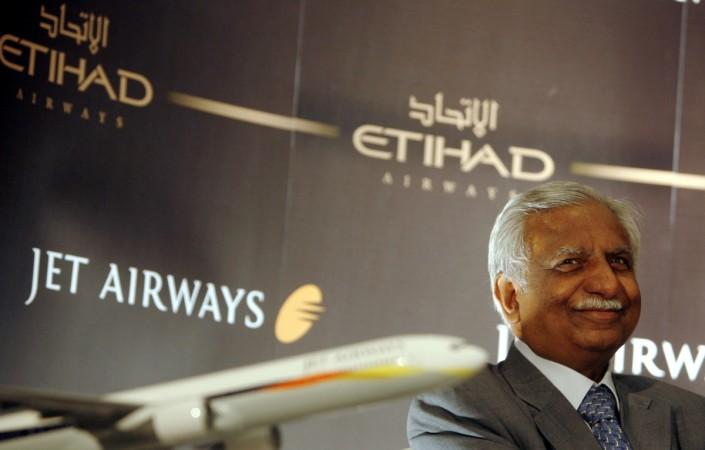![[Representational Image] jet airways, jet indian pilots, jet expat pilots, jet airways share price, National Aviator's Guild](https://data1.ibtimes.co.in/en/full/643129/jet-airways-jet-indian-pilots-jet-expat-pilots-jet-airways-share-price-national-aviators-guild.jpg?h=450&l=50&t=40)
Jet Airways founder and chairman Naresh Goyal could consider pruning his equity stake in the company to as low as 15 percent in order to prevent the embattled airline going belly up, as per new reports.
The airline, India's biggest full-service carrier, has grounded planes, cut pilots' salaries and deferred salary payments in a bid to preserve cash. It has also been reported that Goyal was in talks with potential buyers including Etihad Airways and the Tatas.
In the latest development in the long-running saga, Goyal had a meeting on Sunday with Etihad group CEO Tony Douglas in Dubai, reported the Economic Times.
Abu Dhabi's Etihad Airways has a 24 percent share in Jet, which Goyal founded in 1993. Before Jet's troubles worsened, Etihad had reportedly shown interest in taking a controlling stake in the loss-making airline, but Goyal, who holds 51 percent, had declined the offer.

Jet Airways is now reeling under a debt pile of 81.5 billion rupees ($1.2 billion). In the year ended 31 March, the airline reported a loss of Rs 636.45 crore. The company hasn't made profits in nine out of the last 11 years.
Last month, the cash-strapped airline reportedly sought a loan moratorium from the banks in a bid to tide over the liquidity problems. The airline has also been trying to raise loans in the market but banks have insisted on a turnaround commitment.
With the outlook worsening, Goyal is now willing to dilute his equity stake drastically and give operational control to Etihad if a deal comes through, ET said.
The Tata group had also shown interest in the airline, but the proposal was for a buyout, wherein the Tatas, in partnership with Singapore Airlines, would take over complete ownership of the carrier.
Goyal is reportedly pursuing a deal under which he would remain the chairman of the company. All that remains to be seen is, if Etihad will put in good money after the bad.

















